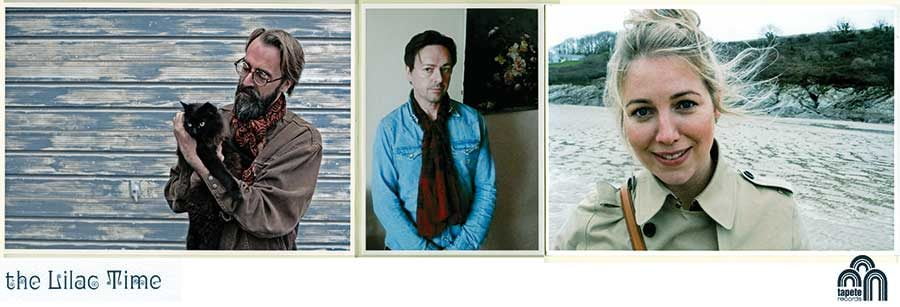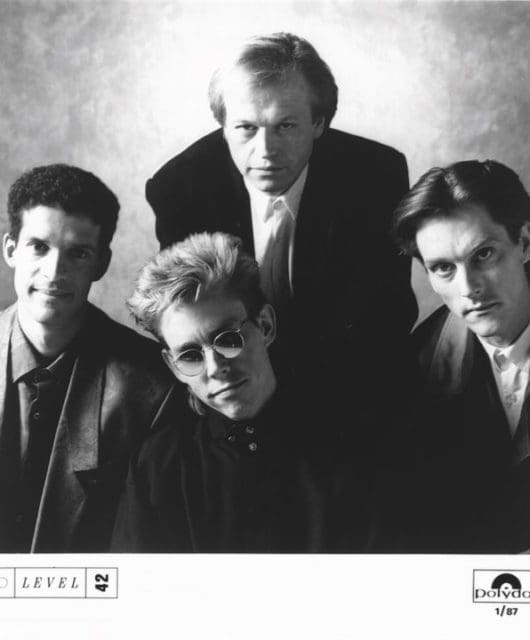Stephen Duffy interview: “I had a dysfunctional relationship with touring”
By Steve O'Brien | September 11, 2023

As The Lilac Time release their latest album, Dance Till All The Stars Come Down, frontman Stephen Duffy reflects on his reinvention as a folk troubadour…
For a man who co-founded Duran Duran and was responsible for one of the 80s most infectious floorfillers, the No.4-charting Kiss Me, Stephen Duffy was never keen on the mainstream pop of the time.
“I wasn’t that comfortable with the synthesizers and drum machines,” he tells Classic Pop over Zoom from his home in Falmouth. “I was having a hard time with it.”
With that in mind, in 1986 the man the world knew as Stephen ‘Tin Tin’ Duffy put his solo career on hold for a band project that would eventually see him dropped by his record label, Virgin.
“I played them half the album and they didn’t even want to hear the rest,” he laughs. “They wanted me to carry on making dance records, and why not? But I just felt like it was time to get back to the acoustic guitar, which was where I started, and do the absolute opposite of everything that was going on.”
Before The Lilac Time (the name is from the Nick Drake track River Man – “Going to see the river man/ Going to tell him all I can/ About the plan/ For lilac time”), there was little in Duffy’s musical oeuvre that suggested he was a frustrated folkie.
There was Duran, of course, which he co-formed at Birmingham Polytechnic in 1978 with Nick Rhodes and John Taylor (Stephen left after just a year), and the band Tin Tin, which later gave the singer his solo moniker.
Then there was his album of experimental house (Designer Beatnik by Dr Calculus mdma) and those synth-drenched solo singles – Kiss Me, Icing On The Cake, Unkiss That Kiss… That Stephen Duffy of all people would go folk seemed as likely as Twisted Sister putting out a shoegazing album.
But folk music had always been part of Duffy’s life. “The first group I ever saw, when I was nine, was The Incredible String Band,” he says, “and before punk I’d played in folk clubs with my brother Nick.
“It was really after the Dr Calculus thing that I thought, ‘I’ve got to get back to writing songs on the guitar.’ I’d done a little bit on the Because We Love You album, but it was time to completely dedicate myself to that.”
Quite a gear shift then for an artist whose biggest single had epitomised the sound of 1985.
“I was told back then, ‘You’re never going to be forgiven for Kiss Me, whatever you do.’ So that was part of why I thought, well, I’ll be The Lilac Time now, to draw a line underneath that.”
Fast forward nearly four decades and The Lilac Time are still with us (in your face, Virgin!), albeit a few members down from that 1986 line-up, and about to release their 11th long-player, Dance Till All The Stars Come Down.
It’s a remarkable record – tender, lush and whisperingly intimate. At the age of 63 and 38 years on from his debut solo LP, Stephen Duffy may have produced his masterwork.
 “I think it’s our best album,” he states proudly. “I really feel that. I approached the songs on this thinking, let’s make them all as if it’s not only the last song I’m going to write, but the last song anybody’s gonna write. So each one had to sum something up, everything had to resolve, there had to be a point to it all. I think it’s the most complete bunch of songs I’ve ever written.”
“I think it’s our best album,” he states proudly. “I really feel that. I approached the songs on this thinking, let’s make them all as if it’s not only the last song I’m going to write, but the last song anybody’s gonna write. So each one had to sum something up, everything had to resolve, there had to be a point to it all. I think it’s the most complete bunch of songs I’ve ever written.”
For all its sonic warmth, however, there’s a sharp lyrical bite to many of the record’s tracks. Lead single A Makeshift Raft was the first song written for the album and was inspired by the photo of the body of two-year-old Syrian refugee Alan Kurdi who drowned in the Mediterranean Sea in September 2015. “We fight a war we say no more,” Duffy sings, “Then we go on as before/ Will they hate forever more?”
“That children fleeing chemical warfare are being demonised and drowned, and that such tragedy is being used to exacerbate racism to serve as a distraction to and garner support for a morally and politically bankrupt Conservative party is the tragedy we are living through,” he says testily.
There’s similar Tory-bashing on second 45 The Long Way which asks, “Who votes to be homeless/ To be unemployed/ Who votes for kindness/ To be destroyed/ They offer just hatred/ Or suicide”. The song, Stephen insists, is a “rebuke to Conservative voters.”
“I grew up in the 60s and 70s and thought we were on a beautiful trajectory away from stupidity,” Stephen explains. “Regardless of how abhorrent and shameful the Thatcher years were, I believed that virtue and righteousness would prevail. And however unlawful and hateful the current Conservative government is, it is crucial we still believe.”
Duffy says he’s always seen The Lilac Time as a political band but, generally speaking, Dance Till All The Stars Come Down is a less charged record than 2019’s Return To Us. Here, there are songs about the Californian wildfires, Allen Ginsberg and the joys – and occasional miseries – of touring (in LP closer The Band That Nobody Knew).
“It’s about us and every band,” he says. “I had a dysfunctional relationship with touring. I saw it more as an extension of my social life, or just a more out and about version of my life. I never saw it as work and as many will attest didn’t really see myself as an entertainer. I would only want to sing the songs that I was enthusiastic about, which were mainly the new ones.
“We tried to do one of those ‘band plays the album all the way through’ things at the Port Eliot festival a few years ago. We chose the first eponymous [The Lilac Time] one, but I had to bail on the concept as it began to depress me and the idea just felt so constricting. I can’t imagine how bands tour their old songs night after night.”
The Lilac Time currently comprises Duffy, plus brother Nick, and wife Claire, who joined in 1999 after the band regrouped after an eight-year hiatus.
Nick has been at Stephen’s side through most of his musical life and it’s clear that, unlike many other rock and pop families, from the Wilsons to the Finns to the Davies’, there’s an unshakeable bond there that has prevented them from ever suffering an Oasis-style flare-up.
“We started in the same place,” Stephen says. “The Incredible String Band, T. Rex… Then, after looking at our parents and relatives being so miserable going to work, we decided, we’re not going to work. And we both went to the same art college four years apart.” He pauses and smiles. “But he didn’t start Duran Duran!”
So what keeps the relationship harmonious? Duffy says that, beyond their familial closeness, it’s because he allows his brother complete freedom within the band (on this record, Nick plays the banjo and accordion).
“I write most of the songs obviously, but there’s usually an instrumental or two, and I let him do whatever he wants,” the singer says. “If he wasn’t here, it would probably be a solo record.”

One Lilac Time project that Duffy has been undertaking on his own is the long-gestating (and by long-gestating, we mean long-gestating) book that promises, according to the website lilactimebook.com, “previously unpublished photographs, notebooks, memorabilia, and ephemera in The Lilac Times: the story of a very English band of folk devils.”
“I’ve been writing it since 1978,” he tells us, suggesting the book will cover Duffy’s life and career before and after the inception of The Lilac Time. “But it is actually happening now. I’ve almost got to the bit where we split up.” He holds up a bunch of Winnie the Pooh-covered notebooks.
“It’s mainly about the songs and the experience of writing and recording them. But then everybody else is wading in with their incredibly misguided interpretations of what I was up to. The wonderful thing is, [original] drummer Michael Giri’s take on it is so unlike the other members of the band, that it’s like a completely different story.
“So it’s a lot more interesting than I thought it was going to be. But the trouble with things being a lot more interesting is they take a lot more time because if it was boring, you’d kind of get rid of it as quickly as possible.”
Duffy says the deadline was to have been this year, but has now been shifted to 2024. Also arriving next year is, he promises, a “15- or 20-album boxset”. “It’s going to be a career overview,” he teases. “Before the second album became Because We Love You it was called Cocksure and I did it with Stephen Street.
“I remember leaving the Fallout Shelter studio in Hammersmith thinking we’d finished it and we actually have that tape. That’s never been released. Obviously Unkiss That Kiss wasn’t a hit, so they [the record label] started tearing it apart and sticking it back together. Hopefully people will like it.”
Until then, Stephen Duffy appears to be enjoying the good life, with a healthy balance of work and family. He and Claire moved to Cornwall in 2007 and, as he says, “Life is quite kicked back here.”
“There’s a certain Jamaican ‘soon come’ attitude,” he says about living in Falmouth. “It does feel so much, not slower, but so much more relaxed down here. I try to spend as much time with my daughter as possible, which means getting up with her and walking to school… I love all of that kind of stuff.
“I just try to do as many hours as possible. It’s been a great blessing or a gift really to be able to do this kind of work. And with The Lilac Time, who have never really sold many records, to be able to continue doing this work, it’s like a vocation.”
Life may be quieter for Stephen Duffy now from the time in the mid-90s when he was living in a rented flat in Camden at the centre of the Britpop happening, to co-writing Robbie Williams’ 2005 album Intensive Care in Los Angeles, but there’s still fire in his belly.
At the age of 63, he’s still managing to put out albums at a greater pace than many artists half his age and it’s easy to think that, however great Dance Till All The Stars Come Down is, Stephen Duffy still has it in himself to top it.

All photos copyright All Cats In The Yard
- Want more from Classic Pop magazine? Get a free digital issue when you sign up to our newsletter!

Steve O'Brien
Steve O’Brien is a writer who specialises in music, film and TV. He has written for magazines and websites such as SFX, The Guardian, Radio Times, Esquire, The New Statesman, Digital Spy, Empire, Yours Retro, The New Statesman and MusicRadar. He’s written books about Doctor Who and Buffy The Vampire Slayer and has even featured on a BBC4 documentary about Bergerac. Apart from his work on Classic Pop, he also edits CP’s sister magazine, Vintage Rock Presents.www.steveobrienwriter.com





